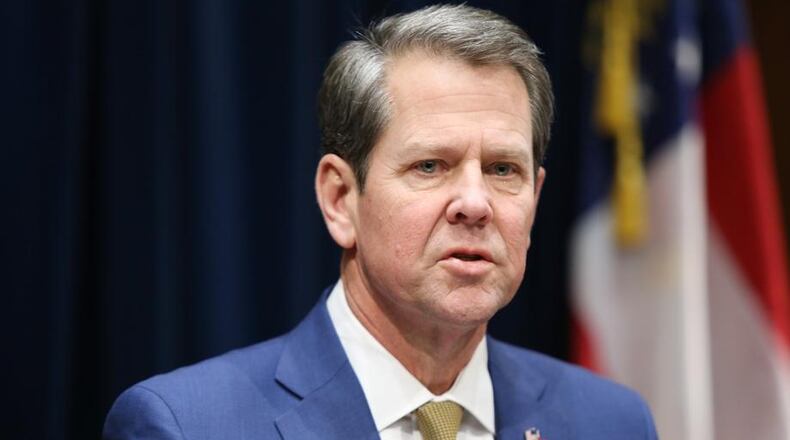The state received disappointing tax collections for a fifth consecutive month in November, bolstering Gov. Brian Kemp’s push for spending cuts.
The revenue news Friday comes about a month before lawmakers will reconvene for a 2020 session in which they will consider both Kemp’s cuts and whether to further reduce the state income tax rate. An earlier rate cut has likely played a major role in the revenue slide.
State officials reported that November collections were down about 1.2%, or $22.4 million from November 2018. For the fiscal year, which began July 1, collections are down 0.3%, or about $33.6 million.
While that may not seem like much in state with a $27.5 billion annual budget, collections will have to pick up for the government to raise enough money to fund its spending on obligations such as K-12 schools, roads, prisons and public health care.
“It is very clear right now the state is facing the most significant revenue challenges it has faced since the Great Recession,” said Danny Kanso, a former aide to Lt. Gov. Casey Cagle and a budget analyst with the Georgia Budget & Policy Institute.
A drop in individual income tax collections — down 3.4% in November — accounted for the overall decline for the month.
Gross sales tax collections — the state’s other top source of revenue — were up 4.5% over November 2018, a sign that Georgians are spending more as the economy continues to grow.
Overall tax collections also declined in October.
Through the state’s budget, taxpayers help educate 2 million children, provide health care to more than 2 million Georgians, build roads and bridges, manage parks, investigate crimes and incarcerate criminals, and regulate insurance firms and utilities along with dozens of professions.
Kemp administration officials have seen several months of slow tax collections since taking office in January.
With that in mind, in May, the administration told state agencies and school districts they wouldn't have to contribute about $200 million into Georgia's massive health insurance program for teachers, state employees and retirees for a month to make sure they didn't run a shortfall.
Kemp this summer ordered agencies to prepare 4% spending cuts this fiscal year and 6% next year, to both prepare in case of a recession and provide money for his priorities, such as teacher pay raises.
While much of Georgia's economy remains strong, the state's fiscal economist told lawmakers in September that there was a 50-50 chance of a mild recession next year.
Kemp’s budget cuts would save about $200 million this year and $300 million next year.
Part of the reason for the slowing of revenue growth was the General Assembly's election-year decision in 2018 to lower the top state income tax rate from 6% to 5.75%. A lower rate means Georgians are paying a smaller percentage of their income in taxes, but it also means the state is taking in less money to pay for services.
The same legislation says lawmakers can vote when they reconvene in January to lower it again to 5.5%.
With the drop in collections, Kanso said, “You are going to have a lot of people say that’s off the table now.”
House Appropriations Chairman Terry England, R-Auburn, said he’s not sure what impact the declining revenues will have on the upcoming tax vote.
“I hate to be the one to say, ‘let’s not cut taxes,’ ” he said.
But England noted that the reason the governor and lawmakers split up the tax cut into two votes was to give them time to see the result of both the first state income tax reduction and the federal tax cut approved by Congress in 2017.
He said Georgia is already one of the lower spending states nationally, and other officials have said the state will have to cut even more spending if the second tax break is approved.
OUR REPORTING
The Atlanta Journal-Constitution has been reporting on the state’s budget problems for months:
- JUNE: The AJC reports that the Kemp administration had state agencies skip a monthly payment into the health care program for employees and retirees to ensure that the fiscal 2019 budget balanced.
- AUGUST: The AJC reports that Gov. Brian Kemp wants agencies to develop plans to cut their fiscal 2020 budgets by 4%and fiscal 2021 budget proposals by 6%.
- SEPTEMBER: At legislative hearings, lawmakers are told the chance of a mild recession is 50-50 next year.
- OCTOBER: The AJC reports that agencies are calling for hundreds of state employees to be laid off, forced to switch jobs, take pay cuts or be furloughed.
- NOVEMBER: The state announces tax collections are down 1.6%for October and off slightly for the fiscal year, a trend one top lawmaker calls "alarming."
- DECEMBER: The state announces tax collections down again in November.
About the Author
Keep Reading
The Latest
Featured




